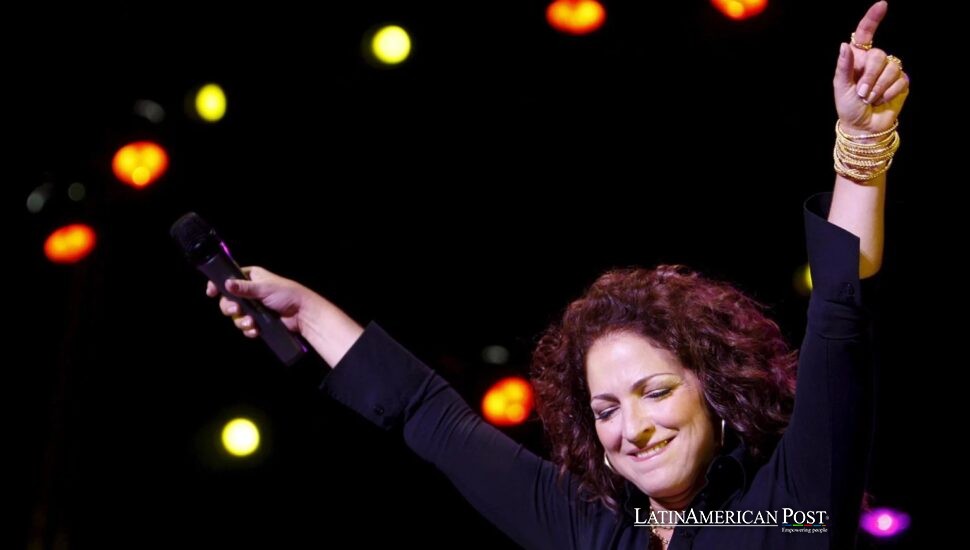Gloria Estefan Stirs Latin Pride with Powerful Tropical Roots Revival

Gloria Estefan—ever the trailblazer of bilingual pop—returns with Raíces, a lush salute to her Cuban heritage that doubles as a rallying cry. As U.S. politics fracture around identity, she plants an unmistakable flag: Latin roots will not be muted.
Back to the Music That Raised Her
Fifty years after Miami garages first echoed with her teenage harmonies, Gloria Estefan slips on studio headphones and lets a ghostly conga pulse through the speakers. The arrangement is raw—an upright bass thumping like old Havana dusk, bongos rattling against wood, brass horns flirting with a son montuno riff. She closes her eyes and hears childhood: a mother humming Celia Cruz while ironing, a grandmother teaching bolero steps on tiled floors, radio static giving way to Olga Guillot’s velvet heartbreak.
That sensory rush ignites Raíces (Roots), her first all-Spanish album in almost two decades and the one she calls “my love letter to the culture that built me.” Speaking to EFE, Estefan admits the record is a kind of protest. Anti-immigrant rhetoric has spiked again; Latino history courses are being questioned in school boards from Texas to Wisconsin. “When someone tries to shade us invisible,” she says, “music is how I flip on the light.”
She and husband-producer Emilio Estefan kept the sessions intimate: live percussion, no Auto-Tune, brass sections cut straight to tape. Every track travels a memory lane—”Bajo un Solo Son” reimagines the street-corner serenades of Little Havana; “Mi Niño Bello” is a bilingual lullaby she wrote for grandson Sasha, its chorus drifting between English endearment and Spanish devotion. Celia Cruz’s spirit prowls through “Guarachera del Alma,” a tribute layered with trumpets that shout and sugarcane rhythms that snap. In “La Vecina,” she sings from the steps of her old Miami apartment block, the same building that once sheltered mothers whose husbands were jailed after the Bay of Pigs.
The compositions may feel vintage, but the intent is urgent. “These songs say, ‘We are woven into this country,'” Estefan insists. “Erase us if you dare—our chorus will still catch the wind.”
Family Threads and Unfinished Dreams
Raíces isn’t only nostalgia; it is family business in its purest sense. Emilio, her musical and life partner for forty-nine years, crafted most arrangements after midnight sessions in their kitchen—coffee percolating, sheet music curling under ceiling fans. “Each demo felt like he’d slipped a handwritten love note through the door,” she says, smiling at the memory.
Their daughter Emily Estefan, a Grammy-nominated musician, played guitar on several tracks between rehearsals for Basura. The stage musical mother and daughter are co-writing about a Paraguayan youth orchestra that turns landfill scraps into violins. Basura premieres in 2026, but its heartbeat already echoes in Raíces: resilience as melody, creativity as oxygen.
Estefan’s granddaughter hasn’t been born yet; still, the singer is plotting a future version of “Mi Niño Bello” with altered pronouns. “Legacy means planting seeds you might never harvest,” she muses. That theme surfaces again in the video for “La Vecina,” filmed at “El Cuartelito,” the concrete bunker of apartments where newly arrived Cuban exiles once huddled around transistor radios to hear news from home. Estefan stands on the same walkway where she practiced harmonies as a girl. The walls are repainted, but the echo of hope is unchanged.
She feels those women—her mother and her aunts—whenever she lingers on a low note. “They carried families on their shoulders while the world looked away,” she says. They still sing through me.”
Roots as Resistance, Rhythm as Bridge
Walk any U.S. street in 2024, and the soundtrack might swing from reggaeton bass drops to Appalachian banjos in a single passing car. Estefan believes mash-up is America’s most significant promise—and its most contested territory. When a governor rails against “woke culture,” when lawmakers slash bilingual program budgets, she hears the rumble of erasure. Her answer: amplify the very sounds deemed foreign.
Every cut on Raíces blends eras and borders. A bolero verse slides into a salsa horn break; a Cuban tres guitar converses with Colombian cumbia drums; English phrases peek out like neighbors leaning over balconies. “Why choose one tongue?” she shrugs. “I’ve never dreamed in only one language.”
The album arrives just as Hispanic Americans top sixty-two million. Estefan sees that statistic not as a number but as a choir: farmworkers in Yuma, surgeons in Houston, drag performers in New York, each holding a different rhythmic fragment. Her job, she says, is to braid them into something that thunders through car speakers from Florida to Oregon. Already, she’s mapping a potential tour—small theaters first and big arenas if demand surges. She imagines a set list oscillating between Raíces’ acoustic intimacy and the bombast of “Conga.” “I want abuelas wiping tears during a bolero one minute, then their grandkids pogoing to the next beat.”
Meanwhile, political winds keep shifting. Estefan sits on arts councils, lends her name to voting rights drives, and quietly funds scholarships for DACA students. When reporters ask if she’ll run for office, she laughs —”Music is my campaign manager”— but her stance is clear: culture can soften hearts long before ballots harden positions.
In the liner notes of Raíces she writes only one dedication: “Para los que vinieron antes y los que vendrán.” For those who came before and those yet to arrive, that sentence feels like a bridge suspended across generations, languages, and borders—much like the record itself.
Also Read: Uncover Mexican Legends Maná and Their Enduring Rock Legacy
Will one LP end cultural division? Of course not. But Estefan never claimed the power of policy. She claims the power of a chorus you can’t stop humming on the drive to work, the sway of hips betraying joy even on grim news days. Fifty years after her first gig, she believes a syncopated cowbell can jolt strangers into harmony. Raíces is her latest test of that faith, vibrating with the conviction that once sung aloud, roots entwine rather than divide.
Turn up the volume. The conga line is calling again, and this time, it’s wide enough for every accent in America.





